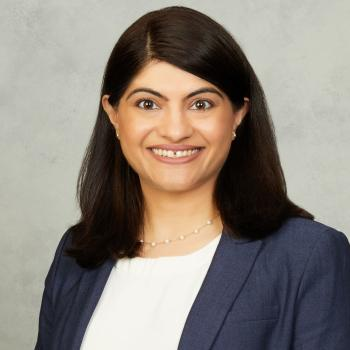Approaches to Manage Frontline Therapy for Multiple Myeloma
During a Targeted Oncology™ Case-Based Roundtable™ event, Surbhi Sidana, MD, discussed with participants how they use quadruplet or triplet frontline regimens for patients with transplant-eligible multiple myeloma. This is the first of 2 articles based on this event.
Surbhi Sidana, MD
Assistant Professor
Department of Medicine
Division of Blood and Marrow Transplantation & Cellular Therapy
Stanford University School of Medicine
Stanford, CA

DISCUSSION QUESTIONS
- How do you manage adverse events (AEs) for patients receiving induction therapy? Does it differ for triplet versus quadruplet therapy?
- What are the available treatment options for patients with transplant-eligible multiple myeloma in the consolidation and maintenance setting?
SURBHI SIDANA, MD: Especially with neutropenia and other AEs, have you noticed a difference in the AEs or is the tolerability comparable when you use a quadruplet versus a triplet?
VEENA CHARU, MD: I have seen a bit more neutropenia [with quadruplet], but otherwise it’s very well handled.
SIDANA: Did you have to use G-CSF [granulocyte-colony stimulating factor] at that time? Did you elect to observe, change the dose, or delay the dose?
CHARU: I elected to observe and delayed the treatment a little bit.
SIDANA: Did this patient have recurrent infections or asymptomatic neutropenia?
CHARU: [Neutropenia was] asymptomatic in this patient.
SIDANA: Are there any other thoughts in terms of AEs or your experience using a quadruplet versus triplet?
SAM YEH, MD: If they’re getting infection and pneumonia, do you check the IgG [immunoglobulin G] level?
SIDANA: We always check IgG levels because we’re following immunoglobulins, but I don’t replace them in the newly diagnosed setting if they are at 300 mg/dL but they don’t have any infections. But, if they start getting recurrent infections, especially sinopulmonary infections…for sure I’m replacing the IgG with IVIG [intravenous immunoglobulin]. Is that your practice, too, Dr Yeh?
YEH: Yes.
SIDANA: I think I’m using a lot of IVIG because I use CAR [chimeric antigen receptor] T-cell therapy, [autologous stem cell] transplant, and bispecifics [in general]. But for these patients, I’m not using that much IVIG.
YEH: Yes, [I use it more frequently] in chronic lymphocytic leukemia than multiple myeloma.
SIDHARTH R. ANAND, MD: I had a question on the CAR T-cell therapy patients who get daratumumab [Darzalex]. Is there any impact on their CAR T-cell therapy efficacy or does that ever play a role if you’re considering CAR T-cell therapy in the future?
SIDANA: No, not at all. There are no data to suggest that. There are some intriguing data [on what will] activate different cells, [and ask] will that synergize? That is a different question, but there are no data to suggest any harm. A lot of our patients get daratumumab before CAR T-cell therapy.
YEH: Our institution seems to think isatuximab [Sarclisa] and daratumumab are interchangeable. What are your feelings about that?
SIDANA: There has never been a head-to-head [trial]. They both target CD38. They are just different epitopes. I think the answer is we don’t know, and some institutions might prefer one versus the other based on formulary [or] based on convenience. The one thing that is not there for isatuximab is the subcutaneous formulation, and sometimes patients have a strong preference one way or the other. But otherwise, I don’t think we can say that there is any difference between one or the other.
THOMAS SPILLANE, MD: For the older patient who is not a transplant candidate, are you still thinking of using the quadruplet regimen? In those patients, dexamethasone and lenalidomide [Revlimid] are some of the more toxic drugs and so dose reducing those [is needed].
SIDANA: The bottom line is mostly I’m using a triplet, but there are some very high-risk, borderline-fit patients whom you’ll [harm] with transplant but they’re otherwise fit and they’re very high risk, like [with] a 17p deletion. [Sometimes] I use a quadruplet combination. There is a niche section of patients who are not transplant eligible where I am using a quadruplet regimen. Have you used it in your transplant-ineligible patients?
SPILLANE: Yes, in a similar situation where they were maybe too old or had comorbid medical problems for transplant but I also felt like a quadruplet was appropriate. But I gave them small doses of lenalidomide, and smaller doses of dexamethasone, and relatively smaller doses of bortezomib [Velcade].
SIDANA: I think dexamethasone is key. No one talks about it too much anymore because it’s not a new drug, but I never give more than 20 mg [daily] of dexamethasone to my patients over 70 years old. I don’t think it’s going to benefit them at all.